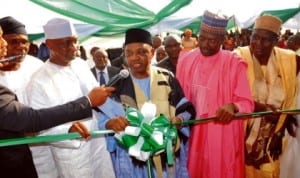Editorial
ASUU: Time To Rethink
President Goodluck Jonathan last week held a 13-hour long meeting with the leadership of the Academic Staff Union of Universities (ASUU) with a view to bringing to an end the four-month-old industrial action embarked upon by the union. Being the highest authority to intervene, everyone hoped for a quick end to the strike but that did not happen.
According to reports, both parties agreed that government is to inject N1.1trn into public universities in the next five years. In this regard, the Federal Government said it would release N220bn to the universities every year for five years. This, ASUU decided to take to their members for consideration.
As expected, they met last Monday to review the outcome of ASUU’s discussion with the President on whether or not to end the strike. At the meeting, the various local chapters of ASUU were said to have deliberated extensively on the subject but opinions were divided.
Amidst seemingly stringent conditions given by ASUU for the final call off of the strike, local chapters, according to its operating guidelines, are expected to vote on whether they agreed with the proposal and that the strike should end or whether they disapproved and the strike should continue.
Thus, decisions reached on the various campuses on Monday would form the plank of today’s ASUU’s National Executive Committee meeting, which will take a decision after aggregating the opinion of various chapters. This is nothing but taking the matter too far and disrespectful of the office of the President
The demand by ASUU is no doubt legitimate and in the interest of tertiary education in Nigeria, ASUU’s obviously rigid stance is unacceptable, especially in the light of intervening variables, increasing sectoral demands and dwindling national economic fortunes.
Although expectations are high as to the outcome of ASUU’s NEC meeting today, the lingering strike by the union can no longer be supported considering some steps earlier taken by the Federal Government and the appeals by parents, students and other stakeholders in the system to end it.
Already, the support the strike enjoyed four months ago has waned because whatever is done without consideration for patriotic input and human feeling will fail the integrity test. Sadly enough, the ASUU strike rather than achieve its desired goal, is going down on record as one action that has dragged the fortunes of education backward in Nigeria.
Having been inundated with appeals by the Federal Government, parents and students for ASUU to re-open the universities to no avail, we wonder what is behind this hard stance, even when nothing in the world is provided for fully all at a time. Like every other need, the ASUU demands should be part of a moving progress.
Instead of reciprocating the many steps taken by government and encouraging their schools to access the Education Trust Fund (ETF) to meet some of the critical infrastructural needs, ASUU is playing like their would not be another day or a time when they would require the assistance of anyone or group in Nigeria.
As it is, The Tide thinks that the strike action has gone rather too far. If ASUU cannot listen to the voice of reason they cannot afford to turn down the President and the people beyond this limit. They should have a serious rethink to avoid some far-reaching consequences.
We cannot support any group, no matter how justified that would not be flexible enough to accommodate national interest in their agitation. Any group that would not mind what happens to the good of the youths of this country cannot pretend to have the interest of the country at heart.

L-R: Nuj Deputy President, Mr Rotimi Obamuwagun, National President, Malam Mohammed Garba, Vice President Namadi Sambo, Minister of Information, Mr Labaran Maku and Chairman Building Committee and Board of Trustees, Otunba Olusegun Runsewe, at the inauguration of Nuj National Secretariat in Abuja last Thursday. Photo: NAN
Editorial
Sustaining OBALGA’s Ban On Street Trading

Editorial
AFCON ’25: Bravo, Super Eagles, But…

Editorial
Fubara: Celebrating A Leader At 51

-

 Sports19 hours ago
Sports19 hours agoArsenal Women End Man City’s Invincibility
-

 Sports19 hours ago
Sports19 hours agoU-20 WWC: Falconets claim qualifier win
-

 Environment18 hours ago
Environment18 hours agoRivers State Government Suspend Fire Service Collection Levies
-

 Environment18 hours ago
Environment18 hours agoLASEMA pushes attitudinal change to cut fire outbreaks in Lagos
-

 Politics20 hours ago
Politics20 hours agoI DEFECTED OUT OF CONVICTION …NO ONE COULD’VE IMPEACHED MY LATE DEPUTY ~ DIRI
-

 Sports19 hours ago
Sports19 hours agoInsurance Deepen Enyimba’s Trouble
-

 Maritime21 hours ago
Maritime21 hours agoCustoms Hands Over Seized Cannabis Worths N4.7bn To NDLEA
-

 Maritime22 hours ago
Maritime22 hours agoOver 6,223 Seafarers Abandoned In 2025 – Says ITF

